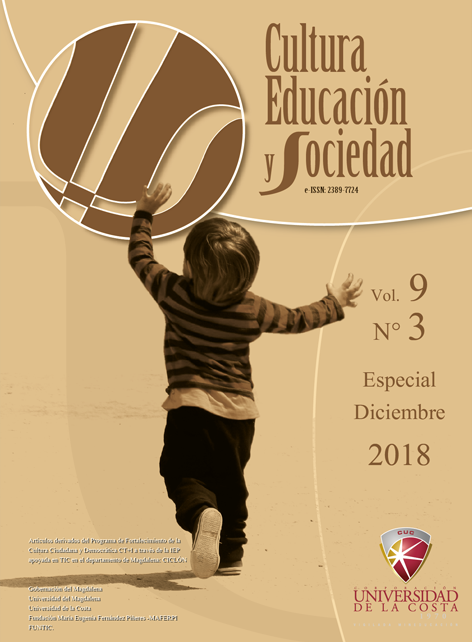Training in values through traditional games using research as a pedagogical strategy
DOI:
https://doi.org/10.17981/cultedusoc.9.3.2018.91Keywords:
training in values, traditional games, research as a pedagogical strategyAbstract
The game is of vital importance in the construction of knowledge and the development that the child acquires to face the different situations of life, through games, children get to get in touch with the world and have a series of experiences in a pleasant way and nice. The objective of the study was to promote the formation of values through traditional games using research as a pedagogical strategy. This was guided under the methodological guidelines of the IEP with a design based on the trajectories of inquiry. The participant observation and the field diary were used as data collection techniques. The population was conformed by forty (40) students of the Third Mixed IED, Sede Las Palmas of the municipality of Magdalena Foundation. It was evidenced that children understood and accepted the rules of the games, becoming aware of their own limitations favored the development of social skills during the interaction with their peers of the activities using different forms of communication, a treatment towards others based on the respect and dignity as basic pillars of human rights.
Downloads
References
Bernabeu, N. y Goldstein, A. (2009). Creatividad y aprendizaje. Madrid: Narcea
Camacho, N. (2014). Propuesta de trabajo sobre los juegos tradicionales en educación infantil. [Tesis]. Universidad de Valladolid. Madrid.
Cardona, A. (2000). Formación de valores: Teoría, Reflexiones y respuestas. México, D.F.: Editorial Grijalbo.
Crespillo, E. (2010). El juego como actividad de enseñanza-aprendizaje. Estudios pedagógicos, 68, 14-19.
Debesse, M. (1967). Las etapas de la educación. Buenos Aires: Nova.
Demarchi Sánchez, G., Aguirre Londoño, M., Yela Lozano, N., & Viveros Chavarria, E. (2015). Sobre la dinámica familiar. Revisión documental. Cultura Educación y Sociedad, 6(2). Recuperado a partir de https://revistascientificas.cuc.edu.co/culturaeducacionysociedad/article/view/1049
Dinello, R., Jiménez, C., y Motta, J. (2005). Lúdica, cuerpo y creatividad. Bogotá, D.C.: Cooperativa Magisterio.
Huizinga, J. (1938). Homo ludens. El juego y la cultura. Amsterdam: University Press
Jiménez, C. (1996). La Lúdica como Experiencia Cultural. Bogotá, D.C.: Cooperativa Editorial del Magisterio.
Jiménez, J. (2009). Los juegos tradicionales como recursos didácticos en la escuela. Innovación y experiencias educativas, 23, 1-17.
Jordán, B. (1996). Tus hijos de 1 a 3 años. 5ª ed. Madrid: Palabra.
Méndez, A. y Fernández, J. (2011). Análisis y modificación de los juegos y deportes tradicionales para su adecuada aplicación en el ámbito educativo. Retos: nuevas tendencias en educación física, deporte y recreación, 19, 54-58.
Pérez, M.C. (2011). El patio de recreo y los juegos tradicionales en la educación infantil. Pedagogía magna, 11, 347-353.
Pujol, E., y González, I. (2010). El gran libro de cuentos con valores. Barcelona: Parramon.
Puericultura el Arte de la Crianza. Bogotá, D.C.: Editorial Médica Panamericana.
Sarmiento, L.M. (2008). La enseñanza de los juegos tradicionales ¿una posibilidad entre la realidad y la fantasía? Educación Física y Deporte, 115-122.
Vygostky, L. (1993). Pensamiento y lenguaje. Obras Escogidas. Tomo II. Madrid: Visor.
Yagüe Sanz, V. (2002). Juegos de ayer y de siempre. Madrid: S.L.
Downloads
Published
How to Cite
Issue
Section
License
Copyright (c) 2018 CULTURA EDUCACIÓN Y SOCIEDAD

This work is licensed under a Creative Commons Attribution-NonCommercial-NoDerivatives 4.0 International License.
![]()
Creative Commons 2020 CULTURA EDUCACIÓN Y SOCIEDAD
This article is under international license Creative Commons Reconocimiento-NoComercial-SinObrasDerivadas 4.0.
The published articles are the sole responsibility of their authors and do not necessarily reflect the opinions of the editorial committee.
CULTURA EDUCACIÓN Y SOCIEDAD respects the moral rights of its authors, who assign to the editorial committee the patrimonial rights of the published material. In turn, the authors inform that this work is unpublished and has not been previously published.
All articles are under a:
Licencia Creative Commons Atribución-NoComercial-SinDerivadas 4.0 Internacional.
![]()


 English
English
 Español (España)
Español (España)




_12.53_.27_p_. m_._3.png)





_12.57_.35_p_. m_._3.png)
_12.50_.37_p_. m_._3.png)



